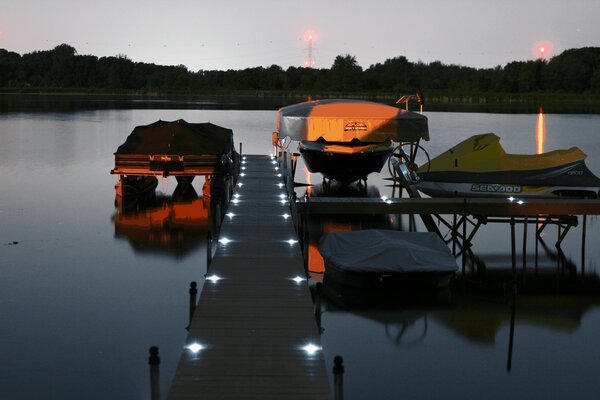Boat Lift Motor Replacement: Signs It’s Time to Upgrade
Owning a boat lift is essential for maintaining your boat, but knowing when it’s time for a boat lift motor replacement is key to keeping your system running reliably. A working boat lift motor ensures the smooth raising and lowering of your boat, enhancing your overall boating experience. Over time, however, motors wear out, especially in harsh marine environments, making it important to inspect and identify the signs that it’s time for an upgrade.
In this post, we’ll discuss boat lift motors, why motor replacement is crucial, and how Lake Lite’s motors that use solar recharged batteries can be a reliable, eco-friendly solution.
Understanding the Lifespan of Boat Lift Motors
The lifespan of a boat lift motor can vary depending on factors like usage and maintenance. Direct drive motors tend to last longer when properly maintained, but environmental factors, like exposure to water and debris, can accelerate wear. Regular maintenance—such as cleaning the motor, inspecting corrosion-resistant hardware, and ensuring parts like the wheel and cables are functioning—can extend the motor’s life.
Saltwater, in particular, is a major factor in corrosion and can cause damage if not addressed. Choosing high-quality hardware and performing routine checks on your motor will help protect it from premature breakdowns. Additionally, knowing when to replace your boat lift motor can help prevent more serious problems and extend the reliability of your boat lift.
Common Signs Your Boat Lift Motor Needs Replacement
Several key signs indicate it’s time for a boat lift motor replacement:
-
Noisy or Sluggish Operation: If the motor produces unusual sounds or raises/lowers your boat slowly, it might be wearing out.
-
Uneven Lifting or Lowering: If the lift is struggling to raise or lower your boat evenly, it could indicate an issue with the motor.
-
Visible Wear and Tear: Check for rust, corrosion, or damage to the motor components. If parts like pulleys or wires are showing signs of significant wear, it's time to replace them.
-
Frequent Breakdown or Malfunctions: If the motor fails to work properly after frequent repairs, it’s a clear indication that you need to upgrade.
Paying attention to these signs can help you avoid bigger issues and keep your boat lift working reliably.
Risks of Delaying Motor Replacement
Delaying boat lift motor replacement can lead to several risks, such as potential boat damage. When a motor fails, it can cause uneven lifting, putting stress on other parts like cables, pulleys, and hardware. Overworked motors increase wear on these components, leading to more frequent breakdowns and costly repairs. Additionally, damaged motors can compromise the safety of the boat lift, which could result in accidents or delays in lowering your boat.
Replacing the motor before these issues escalate can save money in the long run. Installing a new motor ensures your boat lift is ready to operate efficiently, reducing the risk of downtime or damage.
Why Upgrade to a Solar-Powered Boat Lift Motor
Switching to a motor that is solar-powered or offers environmental and financial benefits. Solar-powered motors use batteries recharged via renewable energy to power the lift, significantly reducing energy costs. These motors don’t require an external power supply, only batteries, which makes them ideal for remote locations or areas without reliable electrical access. Solar-powered motors also operate quietly, reducing noise pollution in your area.
Furthermore, DC low voltage motors require less maintenance due to corrosion-resistant hardware and fewer moving parts, making them a low-maintenance solution. The warranty and reliable performance of LakeLite’s solar motors ensure they are a smart upgrade for anyone looking to save on operational costs while reducing their environmental impact.
Spotlight on LakeLite’s Solar-Powered Motors
At LakeLite, we offer high-performance, DC motors that uses batteries recharged by solar panels. These are designed to withstand harsh marine environments. Our motors are built with marine-grade materials and corrosion-resistant hardware, ensuring they last for years in both saltwater and freshwater conditions.
Our solar-powered systems include long-lasting rechargeable batteries and come with easy installation kits to ensure a hassle-free setup. With advanced features like automatic operation and efficient energy capture, LakeLite’s solar-powered motors are the reliable solution for anyone looking to upgrade their boat lift system.
Frequently Asked Questions (FAQs) About Motor Replacement
How do I know if my boat lift motor is compatible with solar power?
To verify compatibility, check if your current power supply can handle the switch to a solar-powered motor. Ensure that the hardware is corrosion-resistant and the system can support solar charging kits.
What is involved in maintaining a solar-powered boat lift motor?
Maintaining a solar-powered motor involves regular inspection of the motor for any rust, debris, or corrosion. Clean the solar panels regularly and check that the batteries are holding a charge.
How does solar motor performance compare to traditional electric motors?
Solar-powered motors are more environmentally friendly, require less maintenance, and offer reliable performance even in harsh elements. They don’t rely on electric grids, providing a more efficient and cost-effective option for boat lifts.
Conclusion
Keeping an eye on the signs that your boat lift motor is nearing the end of its life can help prevent costly repairs and keep your boating experience running smoothly. Regular maintenance is essential to prolong the motor’s life, but eventually, boat lift motor replacement will be necessary.
Upgrading to a solar-powered boat lift motor from LakeLite provides reliable performance, easy installation, and environmental benefits. With low maintenance costs and efficient power usage, it’s a smart investment that helps protect your boat, the environment, and your wallet.


Share:
Are you considering upgrading your dock and deck to solar-powered lighting?
Choosing the Ideal Solar Dock Lights for Your Waterfront